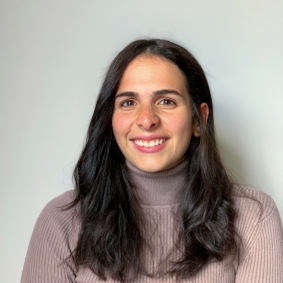Knauss legislative fellowships in Congress help build careers — and they're fun and educational. See our video and fact sheet for details.
Andrea Miralles-Barboza

Fellowship Institution:
NOAA OAR Climate Program OfficeStart Year:
2022Andrea Miralles-Barboza is an International Climate Fellow in NOAAs Climate Program Office. She is a Venezuelan-American who has lived in Massachusetts, Venezuela, Florida and Maryland; all places which shaped her interest in working with culturally and ecologically rich communities that live near the water.
Andrea received her B.S. in Environmental Science and Policy from the University of Maryland, College Park, where she was first introduced to a variety of issues that coastal areas experience due to climate change. Wanting to pursue a career where she could work with coastal communities to adapt their own climate impacts, Andrea returned to College Park and received her M.S. from the Marine Estuarine Environmental Sciences graduate program. In her thesis research conducted along Maryland’s Lower Eastern Shore, she studied how different coastal stakeholder groups understood the climate adaptation “managed retreat”, or a retreat away from vulnerable coastlines. Andrea has also worked in non-profit, federal and academic spaces where she has gained experience in community science, multi-stakeholder adaptation planning and the human dimensions of nature-based solutions. She hopes that her research can help to inform coastal managers and adaptation practitioners around the world about the importance of engaging and empowering coastal communities in adaptation planning processes.
Call for Symposium Presenters and Authors
The Chesapeake Rising: Innovative Law and Policy Solutions for Climate Adaptation in Coastal Communities symposium will explore key legal and policy considerations that affect climate adaptation strategies. It provides a unique opportunity for upper-level law students and early-career lawyers to present and publish their legal scholarship.
Program Announcements
-
-
Maryland Sea Grant has program development funds for start-up efforts, graduate student research, or strategic support for emerging areas of research. Apply here.
News and Blogs
Video Gallery
Sea Grant Film Explores a Diminishing Smithville
Smithville is a community on Maryland’s Eastern Shore, on the edge of the Blackwater National Wildlife Refuge. A century ago, Smithville had more than 100 residents. Today, it has four, in two homes: an elderly couple, and one elderly woman and her son, who cares for her.
Featured Fellow
Featured Research Project
Developing a habitat model for mysids, an important link in Chesapeake Bay food webs
Mysids are important mesozooplankton prey for many species of fish in Chesapeake Bay and are an important link in transferring energy from lower to upper trophic levels. Mysids also serve as biological vectors for benthic-pelagic coupling due to their diel vertical migration and omnivorous prey-switching behavior, which makes mysids important regulators of food web architecture. Despite their central role in coastal food webs, surprisingly little is known about mysid ecology and dynamics in Chesapeake Bay.
The Blue Crab: Callinectes Sapidus
An essential resource for researchers, students, and managers. Get your copy today!


©2025 Maryland Sea Grant. All rights reserved.
5825 University Research Court, Suite 1350 | College Park, MD 20740
Phone: (301) 405-7500 | Fax: (301) 314-5780 | Contact Us



